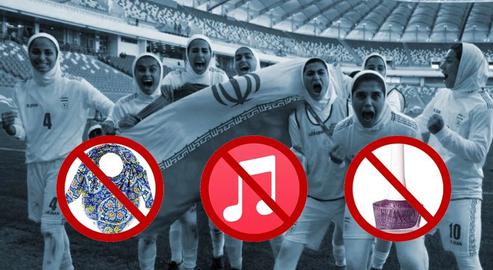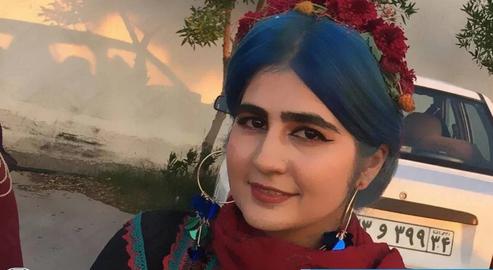For most of the four decades since the Islamic Republic was founded, Iranian sportswomen and female athletes have stepped into international arenas flanked by a shadowy presence: one or more anonymous operatives, described only as their “protectors”.
These security and intelligence agents are paid to monitor and control female athletes’ comportment, hijab, sleeping hours, socializing and even personal matters while outside the country. On the surface they might seem cordial enough, but the reasoning behind their presence is chilling.
The “protectors” submit regular reports to the Sports Ministry and security divisions of Iranian sports federations. These go into the athletes’ case files so that the upper echelons can evaluate their behavior and decide on future travel opportunities – or indeed, on their future careers.
Recently the national women’s football team travelled to Tashkent, the capital of Uzbekistan, to compete in the qualifiers for the AFC Asian Cup. The presence of the “protectors” was heavily felt in a series of incidents that occurred while they were away.
Challenges Before the Trip
The new uniform for the national women’s football team delighted the public. Football fans and regular observers on social media praised it for being more beautiful than even the one worn by female athletes at the 2020 Tokyo Olympics parade. But inevitably, the women’s kit also attracted savage criticism from hardline MPs. So excessive were the complaints that in the end, the Football Federation bowed to pressure from the Sports Ministry and the women were forced back into extra sweatshirts, trousers and hijabs.
Well-positioned sources told IranWire that the first person to find fault with the new uniforms was a woman by the name of Samira Mohammad-Khani, the designated “protector” for the trip to Uzbekistan.
This name could be an alias, like others used by Sports Ministry security agents: the real name of Reza Hosni-Khoo, the long-serving former head of the Sports Ministry’s security division, for example, was Reza Alikhani: the elder brother of popular TV anchor Ehsan Alikhani.
Before the flight, “Mohammad-Khani” had a look at the footballers’ new kit. “Why are the jackets shorter?” she demanded to know. But there was no time to alter the uniforms, so Mohammad-Khani was then forced to convince her bosses at the security department that the uniforms were “proper”. She eventually had to don the same outfit but put a chador on top to cover it up.
Members of the team say that Mohammad-Khani also took pictures of various players and sent them to her bosses in order to get the final permits for travel to Uzbekistan. But the moment the team arrived in Tashkent, criticisms of the uniform soared. Shohreh Mousavi, deputy head coach of the women’s team, accused Mohammad-Khani of dereliction of duty – which in turn drove Mohammad-Khani to take it out on the players. Even when they were on a special chartered flight with an entirely female crew, she threatened to take action against them if they let the headbands of their shawls slip or any hair became visible.
Tashkent: No Music, More Hijab
The qualifying matches for the AFC Asian Cup coincided with Muharram, the first month of the lunar Islamic calendar, when Shia Muslims mourn the martyrdom of Imam Hossein and his family in 680 AD. The “protector” consequently put even more pressure on the players. On bus trips to and from the stadium, she had a welter of sharp comments about the music they were listening to, and finally banned music on the coach outright.
Sources told IranWire that before any game, she also forced the players to put elasticated sweatshirts on under their outfits so no part of their bodies would show if the outer covering moved. The footballers cut the sleeves but, nevertheless, it was warm and this additional hot layer made them run more slowly.
In the beginning, Mohammad-Khani was reportedly warm and friendly with both the players and the technical staff. But her mission was not of a piece with theirs, and soon the cracks began to show. One of her stranger routines was to walk the length of the hotel corridors at night, trying to prevent the players from coming and going during off-pitch hours. This came despite the fact that the team already had a strict sleep regimen the players adhered to.
Then there was the issue of wearing a veil during meals in the hotel. The players wore a type of veil with a built-in headband for moving around the building. But the “protector” was not happy about it, telling them they had to put a separate headband on over their veil.
Mohammad-Khani also took pictures of players who used nail polish on the trip. She told them that those who used nail polish were of a piece with those that didn’t pray, and were not only committing a sin but failing in their religious duties.
Blocking Male Coaches from Players
Another part of Mohammad-Khani’s brief related to the two males accompanying them on the trip: Nosrat Irandoost, the technical manager, and Amir Jamaeili, the goalkeeping coach. As instructed, Mohammad-Khani persistently prevented these two men from standing near or next to the female players.
Irandoost could arguably carry out his job as technical manager from a distance – though this would be far from ideal. But the goalkeeping coach had no means of training the players from afar. Samira Mohammad-Khani had more power as the agent in charge of “security” than the coaches, and always had the last word.
This bizarre situation is unique to Iran’s national women’s sporting teams. It places an additional burden on the shoulders of the head coaches, who must find ways to appease the security agents while appraising, supporting and training up their teams.
Who Are They?
An informed source in the Football Federation told IranWire that security agents and “protectors” are paid for by the federations, but are really employees of the Sports Ministry. To safeguard its female “protectors”, the ministry rotates them between various sports federations. They accompany female athletes on a given team for a few years, and then receive a new assignment.
Most of these agents are given aliases to protect themselves and their families from possible reprisal. They also accompany teenage girls to international events to “protect” their hijab.
For some, this is also a family profession. Sources with knowledge of the Uzbekistan trip told IranWire that Samira Mohammad-Khani’s own mother had been a been a security agent with the Sports Ministry for the past 30 years.
This article was written by a citizen journalist under a pseudonym.
Related Coverage:
Women Speak Out About Violence in Sport
Kimia Alizadeh: Meet Iran's 'Daughter-in-Exile' Who Shone at the Olympics
Star Referee Defies Ban and Shines Again at International Competition
Women Athletes Excluded from Running to Carry the Olympic Flag
Iranian Female Taekwondo Champion Granted Refugee Status by Germany
Iranian Refugee and National Athlete to Face Off in Tokyo Olympics
"A Message of Hope": Five Iranians on the Olympic Refugee Team
Threats to Publish Private Photos Force Female Sports Official Out
Iranian Female Referee in Italy Speaks Out About Her Dreams and the Obstacles She Faces
As Football Fans Return to Stadiums, FIFA Demands Iran Welcome Women
visit the accountability section
In this section of Iran Wire, you can contact the officials and launch your campaign for various problems

























comments